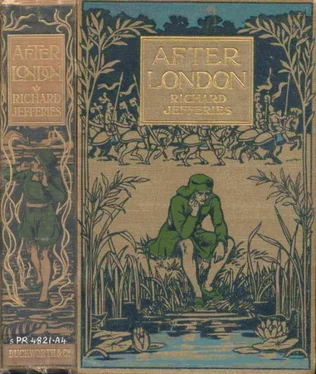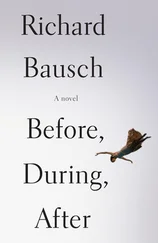Richard Jefferies - After London
Здесь есть возможность читать онлайн «Richard Jefferies - After London» весь текст электронной книги совершенно бесплатно (целиком полную версию без сокращений). В некоторых случаях можно слушать аудио, скачать через торрент в формате fb2 и присутствует краткое содержание. Город: London, Год выпуска: 1905, Издательство: Duckworth & Co., Жанр: sf_postapocalyptic, на английском языке. Описание произведения, (предисловие) а так же отзывы посетителей доступны на портале библиотеки ЛибКат.
- Название:After London
- Автор:
- Издательство:Duckworth & Co.
- Жанр:
- Год:1905
- Город:London
- ISBN:нет данных
- Рейтинг книги:4 / 5. Голосов: 1
-
Избранное:Добавить в избранное
- Отзывы:
-
Ваша оценка:
- 80
- 1
- 2
- 3
- 4
- 5
After London: краткое содержание, описание и аннотация
Предлагаем к чтению аннотацию, описание, краткое содержание или предисловие (зависит от того, что написал сам автор книги «After London»). Если вы не нашли необходимую информацию о книге — напишите в комментариях, мы постараемся отыскать её.
(1885), set in a future in which urban civilization has collapsed after an environmental crisis.” (From
).
This eBook is for the use of anyone anywhere at no cost and with almost no restrictions whatsoever. You may copy it, give it away or re-use it under the terms of the Project Gutenberg License included with this eBook or online at
* * *
After London — читать онлайн бесплатно полную книгу (весь текст) целиком
Ниже представлен текст книги, разбитый по страницам. Система сохранения места последней прочитанной страницы, позволяет с удобством читать онлайн бесплатно книгу «After London», без необходимости каждый раз заново искать на чём Вы остановились. Поставьте закладку, и сможете в любой момент перейти на страницу, на которой закончили чтение.
Интервал:
Закладка:
“My opinion is,” said Oliver, “that that canoe will not float upright. It’s one-sided.”
Felix, usually so self-controlled, could not refrain from casting his chisel down angrily. But he picked it up again, and said nothing. This silence had more influence upon Oliver, whose nature was very generous, than the bitterest retort. He sat up on the sward.
“I will help launch it,” he said. “We could manage it between us, if you don’t want a lot of the fellows down here.”
“Thank you. I should like that best.”
“And I will help you with the cart when you start.”
Oliver rolled over on his back, and looked up idly at the white flecks of cloud sailing at a great height.
“Old Mouse is a wretch not to give me a command,” he said presently.
Felix looked round involuntarily, lest any one should have heard; Mouse was the nick-name for the Prince. Like all who rule with irresponsible power, the Prince had spies everywhere. He was not a cruel man, nor a benevolent, neither clever nor foolish, neither strong nor weak; simply an ordinary, a very ordinary being, who chanced to sit upon a throne because his ancestors did, and not from any personal superiority.
He was at times much influenced by those around him; at others he took his own course, right or wrong; at another he let matters drift. There was never any telling in the morning what he might do towards night, for there was no vein of will or bias running through his character. In fact, he lacked character; he was all uncertainty, except in jealousy of his supremacy. Possibly some faint perception of his own incapacity, of the feeble grasp he had upon the State, that seemed outwardly so completely his, occasionally crossed his mind.
Hence the furious scenes with his brother; hence the sudden imprisonments and equally sudden pardons; the spies and eavesdroppers, the sequestration of estates for no apparent cause. And, following these erratic severities to the suspected nobles, proclamations giving privileges to the people, and removing taxes. But in a few days these were imposed again, and men who dared to murmur were beaten by the soldiers, or cast into the dungeons. Yet Prince Louis (the family were all of the same name) was not an ill-meaning man; he often meant well, but had no stability or firmness of purpose.
This was why Felix dreaded lest some chance listener should hear Oliver abuse him. Oliver had been in the army for some time; his excellence in all arms, and especially with lance and sword, his acknowledged courage, and his noble birth, entitled him to a command, however lowly it might be. But he was still in the ranks, and not the slightest recognition had ever been taken of his feats, except, indeed, if whispers were true, by some sweet smiles from a certain lady of the palace, who admired knightly prowess.
Oliver chafed under this neglect.
“I would not say that kind of thing,” remarked Felix. “Certainly it is annoying.”
“Annoying! that is a mild expression. Of course, everyone knows the reason. If we had any money, or influence, it would be very different. But Sir Constans has neither gold nor power, and he might have had both.”
“There was a clerk from the notary’s at the house yesterday evening,” said Felix.
“About the debts, no doubt. Some day the cunning old scoundrel, when he can squeeze no more interest out of us, will find a legal quibble and take the lot.”
“Or put us in the Blue Chamber, the first time the Prince goes to war and wants money. The Blue Chamber will say, ‘Where can we get it? Who’s weakest?’ ‘Why, Sir Constans!’ ‘Then away with him.’”
“Yes, that will be it. Yet I wish a war would happen; there would be some chance for me. I would go with you in your canoe, but you are going you don’t know where. What’s your object? Nothing. You don’t know yourself.”
“Indeed!”
“No, you don’t; you’re a dreamer.”
“I am afraid it is true.”
“I hate dreams.” After a pause, in a lower voice, “Have you any money?”
Felix took out his purse and showed him the copper pieces.
“The eldest son of Constans Aquila with ten copper pieces,” growled Oliver, rising, but taking them all the same. “Lend them to me. I’ll try them on the board to-night. Fancy me putting down copper! It’s intolerable” (working himself into a rage). “I’ll turn bandit, and rob on the roads. I’ll go to King Yeo and fight the Welsh. Confusion!”
He rushed into the forest, leaving his spear on the sward.
Felix quietly chipped away at the block he was shaping, but his temper, too, was inwardly rising. The same talk, varied in detail, but the same in point, took place every time the brothers were together, and always with the same result of anger. In earlier days Sir Constans had been as forward in all warlike exercises as Oliver was now, and being possessed of extraordinary physical strength, took a leading part among men. Wielding his battle-axe with irresistible force, he distinguished himself in several battles and sieges.
He had a singular talent for mechanical construction (the wheel by which water was drawn from the well at the palace was designed by him), but this very ingenuity was the beginning of his difficulties. During a long siege, he invented a machine for casting large stones against the walls, or rather put it together from the fragmentary descriptions he had seen in authors, whose works had almost perished before the dispersion of the ancients; for he, too, had been studious in youth.
The old Prince was highly pleased with this engine, which promised him speedy conquest over his enemies, and the destruction of their strongholds. But the nobles who had the hereditary command of the siege artillery, which consisted mainly of battering-rams, could not endure to see their prestige vanishing. They caballed, traduced the Baron, and he fell into disgrace. This disgrace, as he was assured by secret messages from the Prince, was but policy; he would be recalled so soon as the Prince felt himself able to withstand the pressure of the nobles. But it happened that the old Prince died at that juncture, and the present Prince succeeded.
The enemies of the Baron, having access to him, obtained his confidence; the Baron was arrested and amerced in a heavy fine, the payment of which laid the foundation of those debts which had since been constantly increasing. He was then released, but was not for some two years permitted to approach the Court. Meantime, men of not half his descent, but with an unblushing brow and unctuous tongue, had become the favourites at the palace of the Prince, who, as said before, was not bad, but the mere puppet of circumstances.
Into competition with these vulgar flatterers Aquila could not enter. It was indeed pride, and nothing but pride, that had kept him from the palace. By slow degrees he had sunk out of sight, occupying himself more and more with mechanical inventions, and with gardening, till at last he had come to be regarded as no more than an agriculturist. Yet in this obscure condition he had not escaped danger.
The common people were notoriously attached to him. Whether this was due to his natural kindliness, his real strength of intellect, and charm of manner, or whether it was on account of the uprightness with which he judged between them, or whether it was owing to all these things combined, certain it is that there was not a man on the estate that would not have died for him. Certain it is, too, that he was beloved by the people of the entire district, and more especially by the shepherds of the hills, who were freer and less under the control of the patrician caste. Instead of carrying disputes to the town, to be adjudged by the Prince’s authority, many were privately brought to him.
This, by degrees becoming known, excited the jealousy and anger of the Prince, an anger cunningly inflamed by the notary Francis, and by other nobles. But they hesitated to execute anything against him lest the people should rise, and it was doubtful, indeed, if the very retainers of the nobles would attack the Old House, if ordered. Thus the Baron’s weakness was his defence. The Prince, to do him justice, soon forgot the matter, and laughed at his own folly, that he should be jealous of a man who was no more than an agriculturist.
Читать дальшеИнтервал:
Закладка:
Похожие книги на «After London»
Представляем Вашему вниманию похожие книги на «After London» списком для выбора. Мы отобрали схожую по названию и смыслу литературу в надежде предоставить читателям больше вариантов отыскать новые, интересные, ещё непрочитанные произведения.
Обсуждение, отзывы о книге «After London» и просто собственные мнения читателей. Оставьте ваши комментарии, напишите, что Вы думаете о произведении, его смысле или главных героях. Укажите что конкретно понравилось, а что нет, и почему Вы так считаете.












